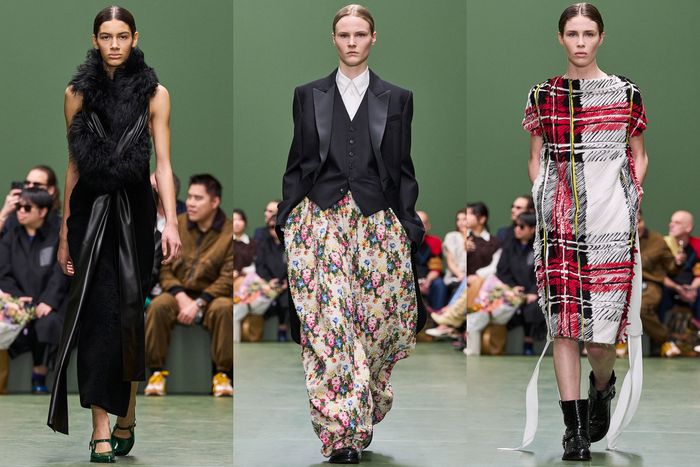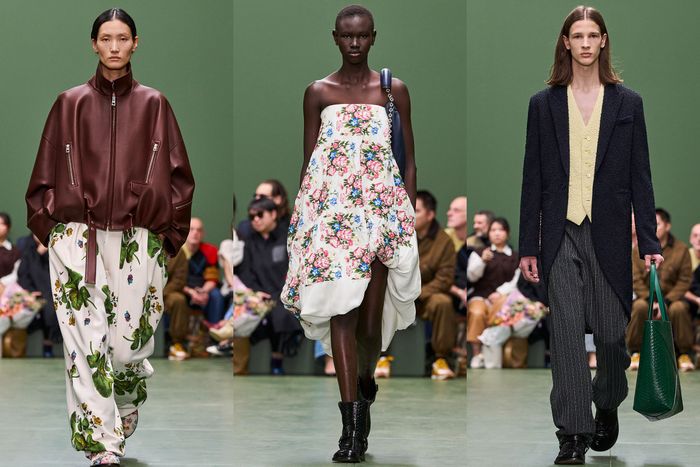
In his Loewe show on Friday, Jonathan Anderson asked the question: Does provenance matter anymore? Given that he brought his audience to a château on the edge of Paris, where he built a green-painted set that resembled a private picture gallery, the answer should be obvious. Of course, it matters. People will always care about the origin and history of something, be it a chair or a handbag. And because a lot of fashion and leather-goods brands have a rich craft tradition, the industry exploits the notion of provenance as never before. So it matters in that way, too.
Anderson was also reflecting upon the British aristocrat. “The idea of an aristocrat is a foreign thing now — it’s nearly nonexistent,” he said. True, the aristocracy has been in decline since the end of the 19th century. Still, it was replaced by the international super-rich, who ape the style of the aristocracy, including the male’s ultimate formal costume — the morning coat with gray striped trousers and an unmatched vest.
“I felt there was something incredibly empowering about it,” Anderson said of the morning suit. “It makes you hold yourself.”
That’s not quite the sense I got from looking at his morning coats, above all the suit that closed the show, and I am sure Anderson and his team at Loewe were never remotely interested in being authentic. High fashion is a different beast from Savile Row. Anyway, I found myself staring in awe at the final suit, and I still can’t take my eyes off images. First, and most obviously, it reminds you again of how extraordinarily beautiful the form of the modern masculine suit is, a point that the late costume historian Anne Hollander made in her classic study, Sex and Suits. It’s the equivalent of Georgian architecture, the Chippendale chair, the Shaker box. It’s just enormously pleasing to look at. And though its details have changed over the past two centuries — when it originated among the English upper classes — the suit’s basic form has remained unchanged.
But I’m in awe for another reason. Anderson’s final morning suit was embroidered all over with tiny caviar beads, though you couldn’t tell that even at a distance of 10 or 12 feet. It’s certainly a stealth approach to luxury and status. But far more than that, it’s a remarkable transformation of a familiar object, indeed one of the most profound and successful I’ve seen in fashion.
Throughout the collection, Anderson found ways to show how things change and often degrade over time, as more and more people consume them. Two other points of reference were interior design by some of the great female decorators of the 20th century, such as Elsie de Wolfe, and the domestic ceramics produced in the 18th century by the Chelsea Pottery factory in England, which were typically copies of French ceramic patterns. Anderson’s team copied them for ditzy-looking floral prints, used for a simple, draped long dress and a super-baggy pair of Oxford bags. They, too, were beaded all over. A tracksuit came in a pink-and-green floral-wallpaper pattern that could have been lifted off a lady’s 1930s bedroom, or a Chelsea tureen. Whatever the source, the beading and utilitarian clothing style brought it far from the original. It may even be regarded as an aesthetic downgrade. He did something of the same with Scottish tartan, making the lines of an organza shift go fuzzy — an effect achieved by painstakingly slicing the fabric.
Anderson, who is a collector himself — of art, furniture and vernacular crafts — also worked a Chippendale chair into some coats. Not literally; it took the form of collars made from carved wood that were then turned a tarnished silver color. You know those ceramic cachepots resembling bunches of vegetables that the middle and upper classes used to place around their living rooms, told ferns or something? You can probably still find them at Scully & Scully in New York. Anderson took that hideous curiosity and turned it into a handbag in the shape of a bunch of asparagus. It, too, was beaded all over. And it now becomes an object of desire, with its own complex provenance.
The collection was stuffed with great clothes, inspiring, like the extra-baggy pants — which looked almost manga or like a puddle of fancy curtains — and the non-embroidered morning coats. That’s worth saying because the show wasn’t all high concept. But it is rare for one to sharpen your eye, and through the well-trodden path of toff formality.
More From Paris Fashion Week
- Charli XCX, Tyga, and Ye Model For Y/Project
- Would You Buy a Bag Made of Air?
- Is Bourgeois Elegance Back?








